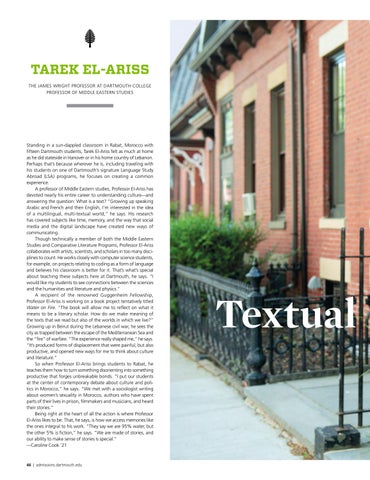TAREK EL-ARISS THE JAMES WRIGHT PROFESSOR AT DARTMOUTH COLLEGE PROFESSOR OF MIDDLE EASTERN STUDIES
Standing in a sun-dappled classroom in Rabat, Morocco with fifteen Dartmouth students, Tarek El-Ariss felt as much at home as he did stateside in Hanover or in his home country of Lebanon. Perhaps that’s because wherever he is, including traveling with his students on one of Dartmouth’s signature Language Study Abroad (LSA) programs, he focuses on creating a common experience. A professor of Middle Eastern studies, Professor El-Ariss has devoted nearly his entire career to understanding culture—and answering the question: What is a text? “Growing up speaking Arabic and French and then English, I’m interested in the idea of a multilingual, multi-textual world,” he says. His research has covered subjects like time, memory, and the way that social media and the digital landscape have created new ways of communicating. Though technically a member of both the Middle Eastern Studies and Comparative Literature Programs, Professor El-Ariss collaborates with artists, scientists, and scholars in too many disciplines to count. He works closely with computer science students, for example, on projects relating to coding as a form of language and believes his classroom is better for it. That’s what’s special about teaching these subjects here at Dartmouth, he says. “I would like my students to see connections between the sciences and the humanities and literature and physics.” A recipient of the renowned Guggenheim Fellowship, Professor El-Ariss is working on a book project tentatively titled Water on Fire. “The book will allow me to reflect on what it means to be a literary scholar. How do we make meaning of the texts that we read but also of the worlds in which we live?” Growing up in Beirut during the Lebanese civil war, he sees the city as trapped between the escape of the Mediterranean Sea and the “fire” of warfare. “The experience really shaped me,” he says. “It’s produced forms of displacement that were painful, but also productive, and opened new ways for me to think about culture and literature.” So when Professor El-Ariss brings students to Rabat, he teaches them how to turn something disorienting into something productive that forges unbreakable bonds. “I put our students at the center of contemporary debate about culture and politics in Morocco,” he says. “We met with a sociologist writing about women’s sexuality in Morocco, authors who have spent parts of their lives in prison, filmmakers and musicians, and heard their stories.” Being right at the heart of all the action is where Professor El-Ariss likes to be. That, he says, is how we access memories like the ones integral to his work. “They say we are 95% water, but the other 5% is fiction,” he says. “We are made of stories, and our ability to make sense of stories is special.” —Caroline Cook ’21
46 | admissions.dartmouth.edu
Textual
